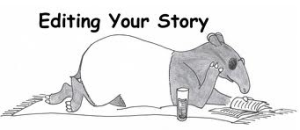In my view, story writing has three essential stages: Discovery, Writing, and Revision.
Discovery is the process by which you discover your story. Bits and pieces of character and plot swirl around in your subconscious before you put words to paper. Consider it creative energy at play rather than feeling guilty that you’re not being productive. This can be the break you need before starting the next novel. It’s time well spent to refill your creative pool and to gather ideas.
Doing a collage, watching movies, listening to music, working on a hobby, walking outdoors, or reading for pleasure are some of the ways you can stimulate your creativity. Cut out photos from magazines of celebrities who look like your characters and fill out your character development charts. Search for relevant articles to your storyline and sift through them. Thus begins your research. Often this prep time can take weeks or even a month or two. If you’re a seasoned writer, you’ll know how long you need. Be sure to factor this in when you determine your target goal of completion for your project.
When these ideas coalesce in your head and your characters begin to talk to you, you’re ready to start writing. This is when I sit down and write an entire synopsis. The synopsis acts as my writing guideline, so I always know where I’m going even if I don’t quite know how to get there. This still allows for the element of surprise. The plot may change as the story develops.
At this stage, set yourself a minimum daily quota. I have to write at least 5 pages a day or 25 pages a week. Beginning a book is the hardest task. It might take until the first third of the book for you to get to know your characters. Give yourself permission to write crap during this heated storytelling phase. Once the book is written, you can fix it. Just get those words down on paper and move forward until the draft is done.
When you finish the first round of storytelling, it’s a good idea to put your book aside so as to gain some distance from it. You’ll be better prepared for revisions with a fresh viewpoint. Use the time to plan your promo campaign, to jot down blog topic ideas, or to write reader discussion questions. When you find yourself eager to tackle the story again, move on to the next phase.
Now come the heavy revisions. This can get intense, because you need to keep a sense of the whole story in your head. You can’t stop, or you’ll lose your train of thought. But you also shouldn’t rush this process if you want to produce what editors call a “clean” copy.
When you set deadlines, be sure to allow a month or so for revisions, because you’ll need to do several read-throughs. My first round of revisions focuses on line editing. Then I’ll read through for smoothness and consistency. The final reading is to catch any remaining errors, typos, or repetitions. You can run your material through one of the online editors like Smart-Edit software or Pro Writing Aid.
I guarantee you’ll always find things to correct, but at some point you’ll be too close to the material to see straight or too sick of the project to work on it any more. Then the book is ready to submit. But don’t worry, likely you’ll have a chance to fix things again when you hear from your editor.
Send it off, clean up your desk, file away your mounds of papers. By now you’re thinking about the next book and are getting ready to start the process anew. Force yourself away from the office and take some time off. You’ll return with fresh ideas and renewed energy.
Now I have to quit procrastinating and get back to the writing stage. After being away for a week, it’s hard to get back in the groove.




I like your point about things coalescing in your head and characters start to talk to you. Maybe that’s the most important part? But I’m a collector of what-ifs. One or two from my list often start the writing ideas churning–plot, characters, and settings–sometimes I find that zone where the prose just flows; other times it’s a slog through the blog. The zone occurrences usually mean more content and copy editing, so there’s something to be said for the slog through the bog!
I get to slog through the blog too, but only after I have written a synopsis. Then I might still have to determine how to get from Point A to Point B but at least the direction is there. It’s a wonderful feeling when you’re in the Zone, isn’t it?
My earlier comment got swallowed. I never write synopses. I’d probably never write the book if I had to. I like to start with a character, and then figure out what I can do to make his/her life miserable. Then I write, and go over every scene in hard copy at night when I’m not in “writing” mode, but rather “reader” mode. I catch a lot that way, including things I’ll have to go back and layer in.. “Oh, THAT was the killer! Guess I’d better foreshadow”. When I hit ‘the end’, I have a draft that’s almost ready for my editor. I have a word count goal for daily production, although when I find I’m writing for word count and not for quality, I cut myself some slack.
Hey, whatever works, Terry. Sounds like this is a viable method for you. In the old days, I could sell a book based on a synopsis, so I got used to writing them.
Excellent post, Nancy! I love this advice:
“Give yourself permission to write crap during this heated storytelling phase. Once the book is written, you can fix it. Just get those words down on paper and move forward until the draft is done.”
The only thing I would add to the revision process is big-picture editing and content-editing – looking for plot holes, scenes that could be cut, condensed, or revised, inconsistencies, discrepancies, continuity problems, character motivations, relationships, and dialogue that may no longer ring true, etc.
Good stuff!
Yes, those different editing phases are why I need several read-throughs. Sometimes you can’t see something right away especially if you’re too close to the material.
“That’s it!” in the immortal words of John Lee Hooker (Mr. Lucky). I’ve always been big on recon–going out into the deep, dark unknown to check out the landscape. Find out what’s really real, before setting out on your project. In this case, it’s the search for story. It all starts with a smell, maybe. An image. A song. A phrase that resonates. The clues are all over the place. Once you’ve done your recon, you can start drawing your map. We’re building worlds out there, eh?
Yes, we are building worlds. I am almost amused when people ask writers where we get our ideas. Ideas are everywhere. It’s having the time to write them all that is scarce.
This is kind of scary; one of us appears to have been watching the other. This is almost exactly what I do. I should have my outline/synopsis for my next beook done by the end of the month, after which I’ll put it aside for a couple of months while I polish the WIP, which has been sitting since October.
I find it also helps me to take my time with the first draft, as things will come to me over the period of weeks/months it takes me to write it. Subsequent drafts rarely have story changes, mostly trimming and cleaning up.
Yes, my drafts too rarely have story changes, maybe minor ones to tighten things up. Then it’s on to line editing and readings for all the factors Jodie mentioned.
Love the ideas. My biggest issue is sitting down and doing it. I also keep Evernote on my phone so when I think of something, even the smallest plot points, I can add it quickly and it ends up at my laptop, ready for me when I finally park my butt and get at it.
When you are ready for the writing phase, it helps to set a daily or weekly quota and do your best to keep it. That way, sitting down and doing it won’t be an issue.
To paraphrase the great Wm. Shakespeare,
“All the world is a stage, and the players have seven acts, and you can’t skip’em or the play sucks! … then you die.”
Or…something like that.
Side note: Did you know that William Shakespeare was the original inventor of disco dancing which led to the popularization of those puffy pantaloons and wide collars. Similarly first run of his play ‘Taming of The Shrew’ was the first documented instance of ‘twerking’ by an actress gone bad, although ‘twerking’ was significantly different from the version and often involved a duck and a several cabbages. Such ‘twerking’ was quickly banned in public due to the rapid increase of people slipping in duck poo.
True story … scoots honor
I am of the old school as I still don’t know what twerking means. 🙂 But Shakespeare is right–you can’t skip any of the stages in the writing process.
A very good discussion. I agree–there’s always something that needs correction. I just went through the edit of the fourth Kim Reynolds mystery, certain there wouldn’t be a single error and still found quite a few.